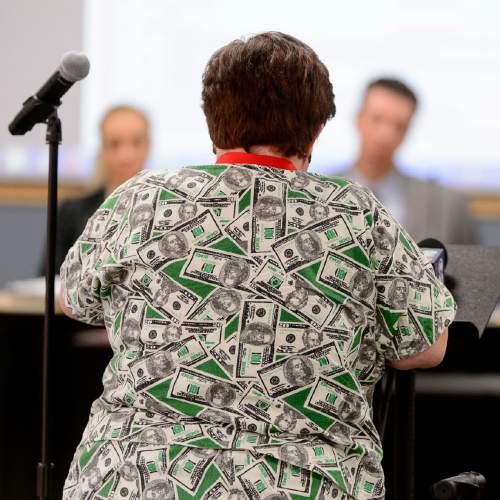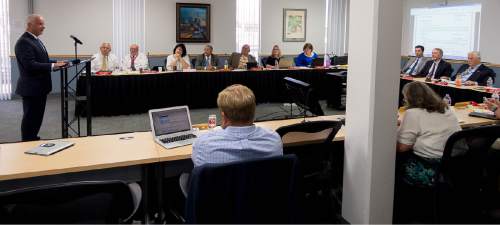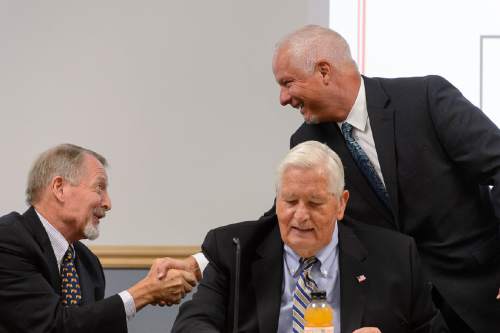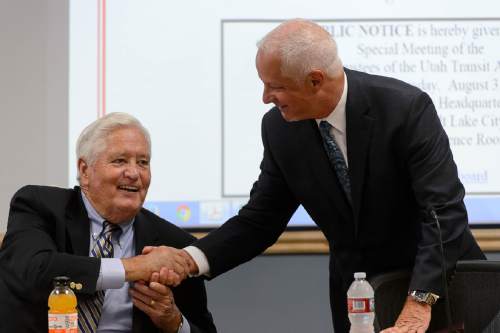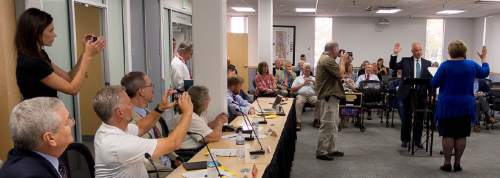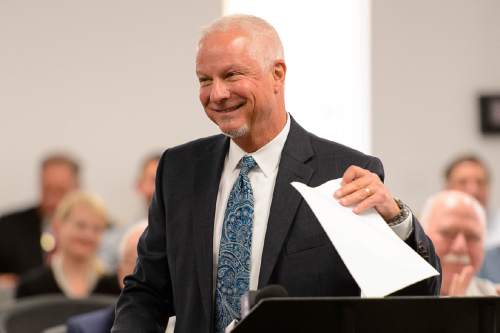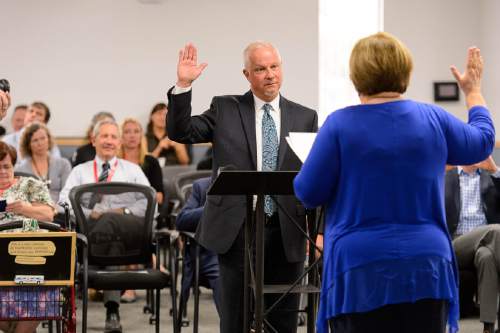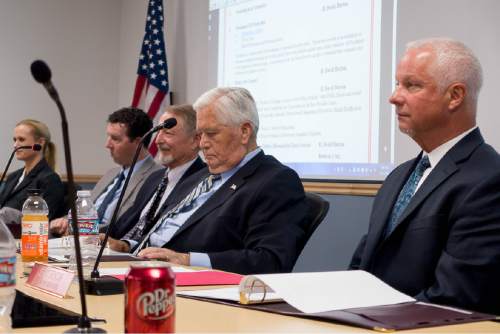This is an archived article that was published on sltrib.com in 2016, and information in the article may be outdated. It is provided only for personal research purposes and may not be reprinted.
After hearing a long parade of praise — and a bit of public opposition — the Utah Transit Authority Board officially hired Jerry Benson on Wednesday as the agency's new president and CEO and gave him a base salary of $274,000.
"Going forward, we will clearly communicate the challenges we face, how we will address those challenges — and we will be accountable and transparent," promised Benson, who served in the past year as UTA's interim president.
He said he plans a listening tour to hear concerns and wishes from riders and public officials to develop a road map for UTA's future.
"Our vision for UTA will include service for our customers, stewardship of our physical and financial resources, and strong collaboration with the community we serve," he said.
Because UTA has been criticized for high executive salaries and bonuses, the board stressed that Benson will receive only his base salary, six weeks of paid vacation a year, a tax-deferred retirement plan, the same benefits given to other UTA administrators — and nothing else: no bonuses or car allowance.
It also changed a previous agreement with Benson that reduces his possible future severance pay from 18 months to nine.
Benson is receiving a raise of nearly $75,000 a year with the promotion after serving a year as interim president. UTA said his base salary rate this past year was $199,441.
The salary of former president and CEO Michael Allegra was controversial. Allegra's total compensation (including pay and benefits) was $402,187 in 2013, which included a $30,000 bonus. Amid criticism, his compensation dropped by $34,579 in 2014 to $367,608 — mostly because Allegra received no bonus.
Allegra's total compensation during his final year in 2015 was $376,896. Of that, his wages and leave totaled $229,596.
UTA spokesman Remi Barron said it is not feasible to calculate accurately the cost of Benson's new total compensation package in advance because "it depends on how they [employees] manage their health and retirement benefits. But, the total costs of benefits generally reflects about 35 percent of the base salary."
Information from the state's transparency website shows that Benson's total compensation in fiscal 2015 was $304,810, including salary and leave of $193,156 (which included a $7,500 bonus).
Benson's new salary is higher than the salaries of some heads of transit agencies nationally who were hired in the past year, but also lower than others.
It is essentially the same as the $275,000 paid to the new head of Denver's transit district. It is higher than the $248,000 paid to the new chief in Philadelphia and the $228,689 paid to the new director in Charlotte, N.C.
But Benson's salary is lower than new chiefs' salaries of $298,000 in Seattle, $327,000 in Los Angeles and $397,500 in Washington, D.C.
Benson originally asked not to be considered for the agency's top job so that he could focus on his responsibilities as interim president. But Board Chairman H. David Burton said it could not find anyone more qualified during a yearlong international search, so the board persuaded Benson to reconsider.
Benson has worked for UTA for 32 years in such roles as chief operating officer, director of human resources and director of corporate communications. He has a doctorate in organizational communication from the University of Utah.
UTA has hired its last three top bosses from within the agency. Benson worked for Allegra, who worked for predecessor John Inglish, who worked for John Pingree.
The UTA gave the public a week to weigh in on Benson's hiring after it was announced last week.
At a meeting Wednesday, groups including the Salt Lake County Council of Governments, the Wasatch Front Regional Council, the Sandy Chamber of Commerce and others praised Benson.
Sandy Mayor Tom Dolan said he had worked with three previous UTA CEOs. "They were great people. Jerry is way and above anyone I have worked with at UTA."
Four people formally raised concerns about Benson, either at the meeting or by sending online comments to the board.
Even some of them lauded Benson, but said UTA would have been wise to hire someone from outside the agency to help build trust eroded by past concerns over executive pay and travel, lack of transparency and sweetheart deals with developers.
"When you continually hire from within, nothing changes," wrote Randy Farnsworth.
"UTA understands it has an image problem. It seems like it wants to show that it has changed somehow, or will be more trustworthy," wrote Christopher Collard. "Hiring someone who has been around for a long time doesn't really convey that message."
UTA Board member Keith Barthlomew said hiring from the outside likely would bring only cosmetic change, while promoting Benson from the inside can bring real change because of his familiarity with UTA operations and staff.
He said for the agency to improve, it needs a chief who is a good observer, welcomes challenge, listens, is not afraid to change his mind and shows respect. "That person is Jerry Benson."


